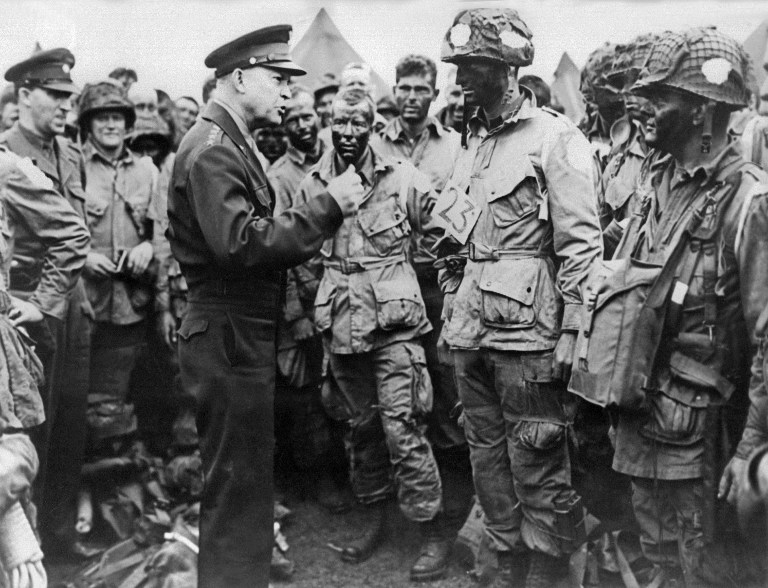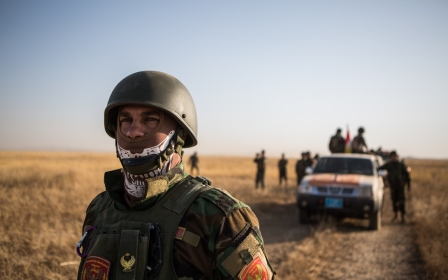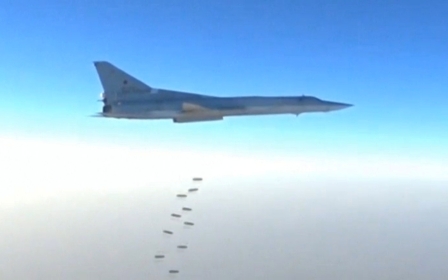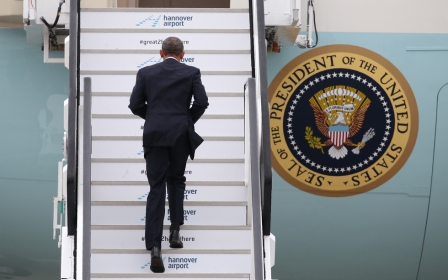What Eisenhower could teach Obama about fighting IS in Mosul

As he contemplates the assault on the Islamic State's bastion of Mosul, President Obama should take some lessons from General Dwight Eisenhower’s fatal hesitation in the dying months of World War Two.
Anticipating the political situation in a liberated Mosul now will be critical to ensure that Sunni disenfranchisement is reversed and the sectarianism that gave rise to the Islamic State group in the first place is combatted.
As World War II drew to an end, Eisenhower, the supreme commander of the Allied forces in Europe, made the controversial decision not to devote extra resources to the race to liberate Berlin, which allowed the Soviet Union to take the glory of that endeavour.
Eisenhower was an old-fashioned general who had been educated in a “military tradition” which dictated that commanders should keep their eyes on the “military road to victory and leave political decisions to civil authorities”.
Soviet forces were far closer to the German capital and the West’s commander felt his primary responsibility was to minimise the losses among his troops given that the rapid Soviet advances in eastern Germany made the fall of Berlin a forgone conclusion.
The result was a heavily empowered and well-positioned Soviet Union, and while this had been less of an issue whilst the Soviets and the West had shared the common enemy in Hitler, Eisenhower’s strategy gave little anticipation to the prospect of a strengthened Soviet Union in the absence of this common foe.
Such concerns, which had been voiced by senior British and US officials before the end of the war, were later realised following the partition of Berlin and the onset of the Cold War.
Jewel in the crown
The capture of Mosul in June 2014 was the event that, more than any other, propelled the Islamic State group (IS) to worldwide infamy. Now the jewel in the group’s crown, its capture will be a huge PR coup for those involved.
As a plethora of forces assemble in northern Iraq for the assault on the country’s second largest city, a much delayed operation that is expected to start in mid-September, Obama appears to be repeating many of the mistakes Eisenhower had been accused of - only without the excuse that it wasn't up to him to make political decisions. He is, of course, the political leader of the free world.
The Iranian-backed Popular Mobilisation Units have shown success pushing north from Baghdad, though many of its military advances have been accompanied by rank sectarianism and war crimes.
In 2014, these Shia militias successfully defended the holy shrine of Samarra when it came under attack. Despite the military success, city councillors claimed that the militias abducted and killed as many as 600 Sunnis.
The militias numbers are vast, as many as 140,000 according to some estimates, and there are real concerns in Iraqi government circles that they are already outside the jurisdiction of the Iraqi state, and indeed merely an arm of the Iranian regime next door.
Strange bedfellows
Operation Inherent Resolve, the US-led coalition seeking to "degrade and destroy" IS that began in October 2014, has so far focused overwhelmingly on air power.
While it has seen some important success, notably in Kobane and more recently Manbij, the coalition has a shortage of reliable partners on the ground, leading the US to work, at times, in a de facto alliance with Iran. The US has, for example, provided air support to Iranian-backed militias commanded by Islamic Revolutionary Guard Corps’ Quds Force commander, General Qassem Soleimani, a man described by US General David Petraeus as “truly evil”.
Even the significant and much lauded advances by Kurdish forces in Iraq and Syria suggest a worrying level of disinterest in the long-term political reality of a post-IS Middle East from the US-led coalition.
Russian influence with the Kurds has grown in recent years in both Syria and Iraq, largely as a result of Western dithering. In both Iraq and Syria, the Kremlin has provided weapons and air strikes in coordination with Kurdish ground advances.
On the Syrian side of the border, Russian support has even extended as far as embedding “trainers” with the Kurdish Democratic Union Party (PYD) in Syria.
Both the Iranian-run militias and the PYD have the potential to pose significant threats to a post-IS region. Russian interests fail to extend beyond preserving their sphere of influence and degrading Western influence, regardless of the humanitarian cost. Such a zero-sum mentality has played a significant part in the disastrous instability in Syria.
Start as you mean to go on
A prosperous and pluralistic Middle East would serve as the best antidote to the terror of IS. Instead, the Kremlin has backed the Assad regime, which is propped up by radically sectarian forces under Tehran's control.
Iran has pumped dangerous sectarian narratives into some of the region’s most brittle areas, mobilising religious identity in an effort to expand its sphere of influence, too.
These are hardly the sort of actors we can expect to lead reconciliation efforts with the ostracised Sunni communities whose disillusionment led to the rapid advances of IS in 2013 and 2014.
While the international coalition in theory shares a common enemy with Russia in the form of IS, the real challenge to rebuilding Iraq and Syria will come once the fighting has ceased and that depends on how IS is defeated. A fumbled approach to choosing allies in this conflict risks setting up the next one.
Letting the Soviet Union be first into Berlin in the Second World War helped set the terms of the Cold War. If Russia and Iran are able to dictate the conditions of the "liberation" for Mosul, it risks setting in place dynamics for the next war that will by no means be cold.
- Gareth Browne is a freelance journalist covering the Middle East. A graduate of the University of Exeter and Arabic speaker he tweets at @brownegareth.
The views expressed in this article belong to the author and do not necessarily reflect the editorial policy of Middle East Eye.
Photo: US General Dwight D Eisenhower, commander for landing operations on the Normandy coast, in England in June 1944, giving orders to parachute before landing operations during WWII (AFP)
This article is available in French on Middle East Eye French edition.
New MEE newsletter: Jerusalem Dispatch
Sign up to get the latest insights and analysis on Israel-Palestine, alongside Turkey Unpacked and other MEE newsletters
Middle East Eye delivers independent and unrivalled coverage and analysis of the Middle East, North Africa and beyond. To learn more about republishing this content and the associated fees, please fill out this form. More about MEE can be found here.





